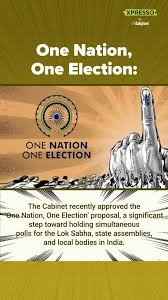One Nation One Election Bill Amid Opposition
Why in the news?
- The government introduced the controversial “One Nation, One Election” Bills in the Lok Sabha amidst strong objections from the Opposition.
- A division vote saw 263 members in favor and 198 opposing the introduction of the Bills, raising questions about the required majority.
Opposition’s Claims
- Opposition MPs, including Shashi Tharoor, argued that the government did not secure the two-thirds majority needed to pass the Constitutional amendment.
- Tharoor criticized the Bills for violating the federal structure and raising concerns about the impact on state governments.
- The opposition claimed a victory, asserting that the vote highlighted the government’s inability to achieve the required majority.
Experts’ Interpretation
- According to D.T. Achary, a special majority is not necessary for introducing a Constitution amendment Bill.
- The constitutional rules specify that a simple majority is sufficient for the introduction and referral of the Bill to a committee.
What Do the Rules Say?
- Rule 157 of the Rules of Procedure outlines that a simple majority is sufficient for the introduction or referral of a Constitutional amendment Bill.
- A special majority (two-thirds of members present and voting) is only required in the subsequent stages of the Bill’s passage through Parliament.
Sources Referred:
PIB, The Hindu, Indian Express, Hindustan Times




